Church Unity: Hope for Society
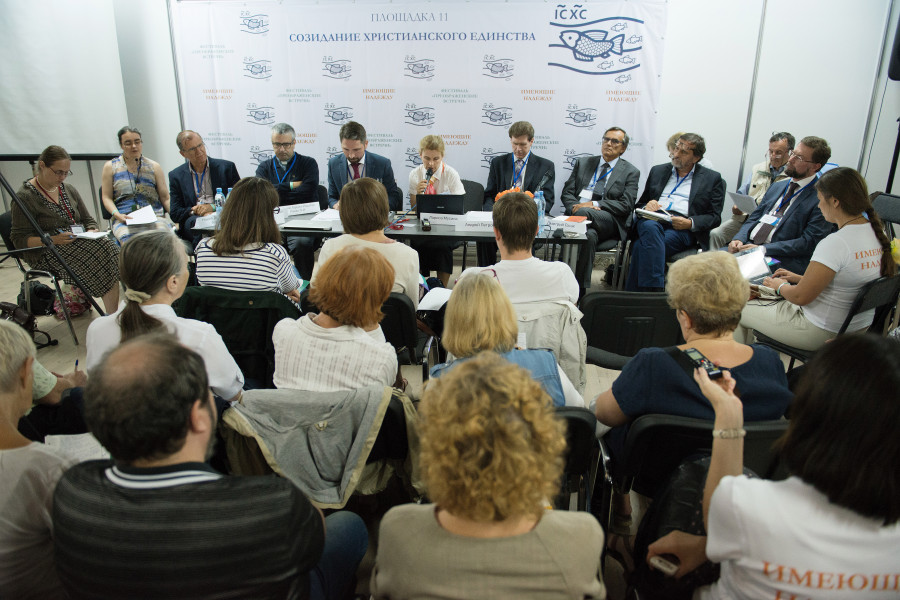
We posed these questions to the participants of a meeting dedicated to “Building Christian Unity”, which took place during our annual Transfiguration Meetings Festival, organized by the Transfiguration Brotherhood. This year our theme was "Those Who Have Hope". Participants represented different communities and spiritual movements - Orthodox, Roman Catholic and Protestant. We hosted representatives from the Christian Association of Italian Workes (ACLI), the Fraternity of Charles de Foucauld, the Community of Saint-Egidio, and different Russian and foreign Protestant communities. The participants shared their experience of rebuilding Christian unity through joint work by Christians of different confessions. We asked the guests to answer several questions regarding the prospects for their work.
– How can movement towards Church unity influence modern society?
Fr. Tomás Garcia-Huidobro Rivas, SJ, St. Thomas Institute, Moscow:
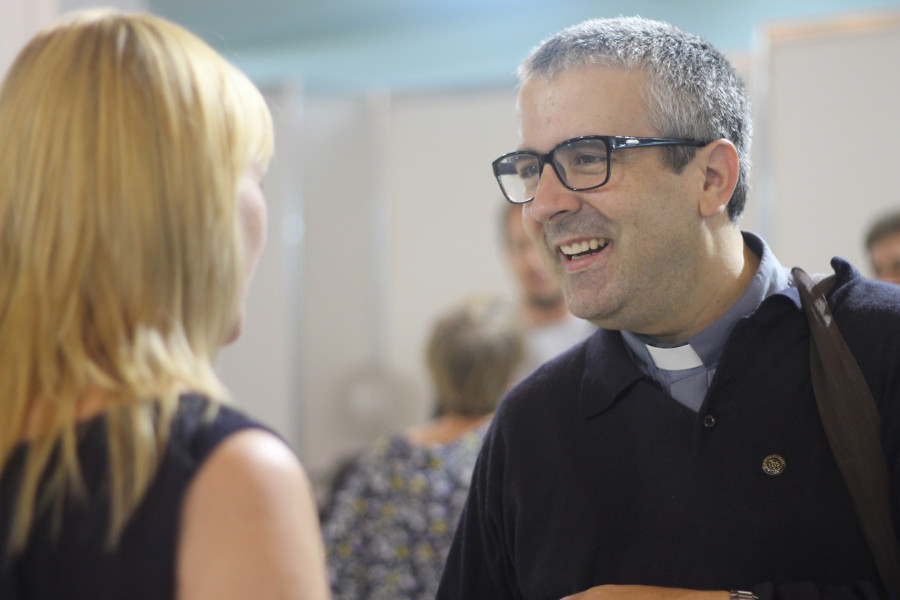
I think there certainly is an influence. There is practical unity when we pray together – Catholics, Orthodox and Protestants – and this brings hope. But when the leaders of our churches fail to meet or cannot agree, then of course common believers regard this as “politics” or as the games of the powerful, and this also influences society by bringing disappointment for the common people. For this reason, the meeting of the Russian Patriarch and the Pope was a true miracle. We can say with all confidence that for most of the people both in Russia, Europe and America, this was a real consolation. And consolation always comes from the Holy Spirit. Every step that brings us closer to unity gives hope to the people. We must all realize that we are on a certain path – the “way” – and the division of Christians is a result of sin. Sin plays a big role here, as well as the issues of power, politics, etc.
Unity is something that requires each of us to invoke God – each of us from every simple believer straight up to the Patriarch and the Pope. Invoke God – in the sense of repentance and change. We must reflect on the way we see our history and how we interpret the history of the Church. And we should revise it both from the Catholic and the Orthodox point of view. We must get to know each other and learn to hear each other. That is why it is so important to have common projects, especially in the field of education.
Dmitry Gasak, Chairman of the Transfiguration Brotherhood, made another important point today when he spoke about the new martyrs of the 20th century and their experience of freedom as the basis for the movement towards Christian unity. We need to exercise this act of freedom – freedom from all sorts of superstitions, from everything that prevents us from meeting each other and seeing each other as brothers. In this sense the words of Pope Francis, spoken at the very beginning of his meeting with the Patriarch, are of great importance. He said: “We are brothers because we share one baptism and we are brothers as bishops”.
Martin Hoegger, Pastor in the Reformed Church and committee member of the School of the Word (Lausanne, Switzerland):
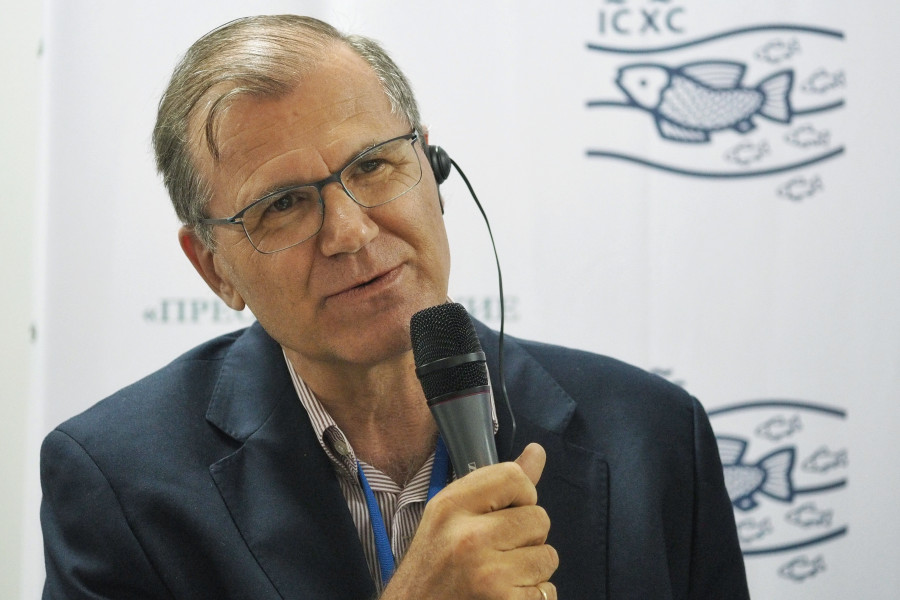
Firstly, I would like to express my gratitude for these few days that I’ve spent here in Moscow with the Transfiguration Brotherhood. It has given me great inspiration and hope as well as a wonderful experience of unity with brothers and sisters. What touched me the most was the brotherly love which I experienced from people in the Brotherhood. And in fact, this also builds Christian unity and spiritual unity. Every lack of unity and every division comes, in the end, from lack of love – from indifference. So, if we want to rebuild Christian unity, we must build loving relationships. This is what brings healing to the Church – to the churches among themselves and to the inner life of the Church as a whole, as well, because in every church there are many tensions, oppositions, divisions, etc.
I was also deeply impressed by participating in two Eucharistic liturgies. The center of the Orthodox liturgy – just as in Protestant worship – is the presence of Jesus among us. Without this presence, there is no communion. But if we don’t love each other we cannot confess our faith in God. And before saying the Creed together we are called to love one another and give each other the kiss of peace. Our God is a God of Love. We confess our faith in the Trinity and in this relationship of love of the Father, the Son and the Holy Spirit. Despite the sadness of not being able to fully participate since our churches do not fully recognize each other’s ministries, there was a very strong experience and a great joy that came from taking part in those two Eucharistic liturgies. Even so it was a spiritual experience of the deep presence of Christ, which continued afterwards during the two agape meals that followed each of the services. This was the first time I had taken part in such agape meals and I was surprised by their simplicity and the atmosphere of love that I found there. This is what the church is really about: people being aware of the presence of Jesus, looking for it and understanding that in order for Him to be present, we must love each other, we must welcome each other, appreciate, recognize, and listen to each other. Unity begins with listening and hearing. At the Transfiguration, the Father says: ‘He is my beloved Son, listen to Him’. But He also says this to each one of us: your brother, your sister who is with you – he is also a beloved son or a beloved daughter, you must listen to him or her. Spiritual unity begins with the ability to listen to each other in the light of the word of God and to make space for inner silence. This is the essential point, much more important than all the other aspects of Christian unity, such as the unity of theology, worship, of receiving the body of Christ together in the Eucharist, or of unity in ministry. If there is no spiritual unity, it will be much more difficult any other aspect of unity. So, the collective experience your brotherhood has is a wonderful contribution to Christian unity, and it gives me great hope. I would even say that your experience of brotherhood can shed new light on theological questions, our understanding of Scripture, Church tradition, and all the church’s various problems – the light of God, the light of Christ, provides new inspiration and new ideas.
Nailya Agliullina, presbyter of the Church of the Corner Stone, in Kazan:
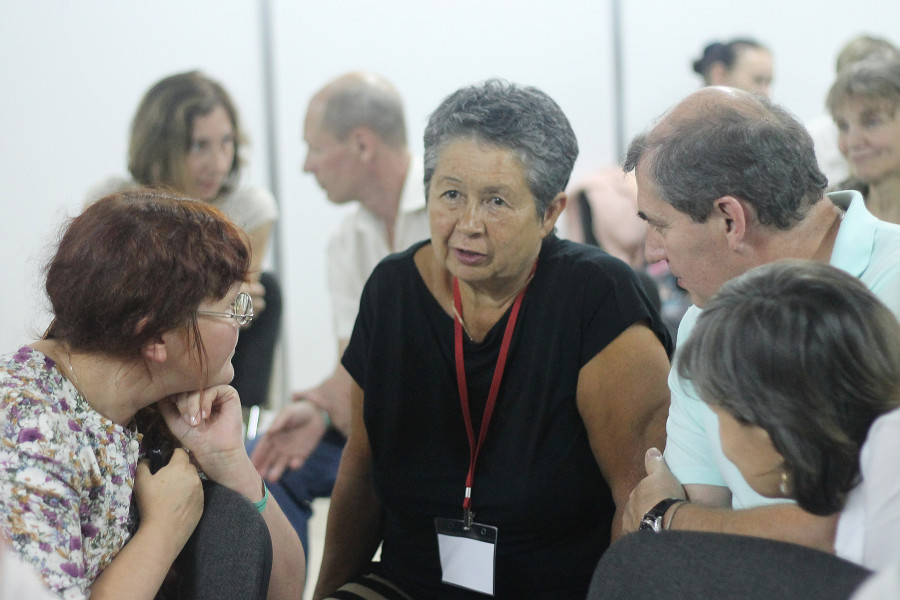
The world is impressed, surprised, converted and changed only by love – that is by Christ Himself, Who is the very Love that the world doesn’t have. But this love is born and comes out from among us precisely when we overcome the sin of self-sufficiency and self-centedness – when we want to be in the centre and determine everything. When we overcome the disunity and disintegration – and this can be done only in Christ, through His love and His presence among us – then the world begins to see this. And then, wherever you may be – whether in education, politics or in any other sphere – if you have love within, all your activities to influence the world obtain a different quality. They are no longer of this world because you are acting out of the world to come.
Even pagans love those who are like themselves. It is more difficult to love someone who is different, who prays in a different manner, who has a different way of believing. It is hard not to renounce him, but rather to step outside of your own borders and see Christ in him.
It is an amazing thing that happens when God is among us. I have seen so many times that people react particularly to this, and not to our social projects. People are sometimes glad to avail themselves of our social projects, but the real influence and change comes only through love, which means through God Himself, through Christ, and only when He dwells within us.
Thus, the question of unity for us is not a question of doctrine, it is a question of how we can make space for God among us. If He is in us and among us, then all our actions become life-giving. And if He is not present, then everything is in vain.
Dmitry Gasak, Chairman of the Transfiguration Brotherhood, Provost of St. Philaret’s Christian Orthodox Institute (Moscow):
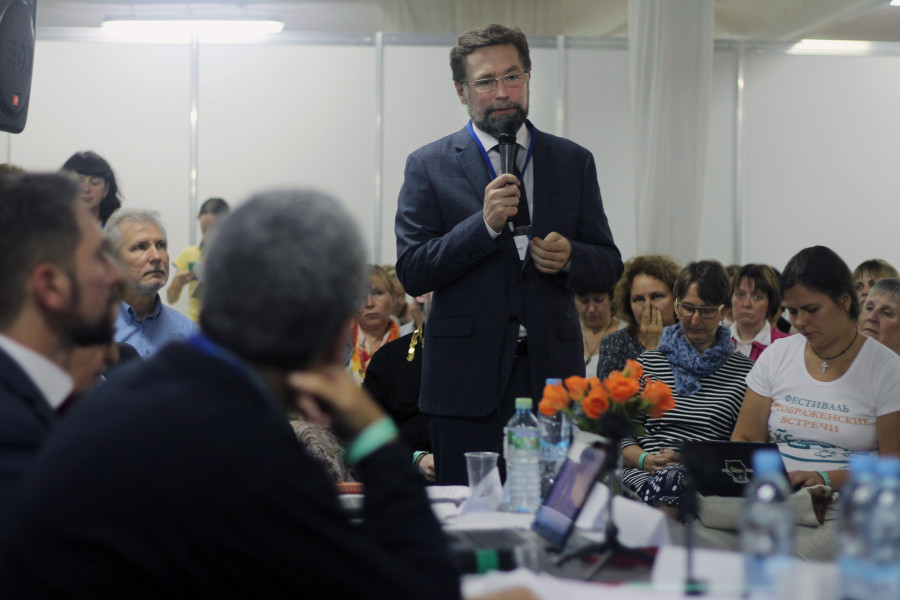
I think that movement toward Church unity is happening, regardless of whether Russian or Western European society notices it or not. Christians aren’t the most indifferent, irresponsible, despairing or egotistical people on the Earth. For this reason, our striving for unity – both in the East and in the West – does have an influence on society. It’s another matter that we aren’t always consistent in our striving and don’t always have enough faith and strength to battle on to the end – until the unity we are striving for is embodied. Sometimes it seems that if Christians would be bolder and more daring, our life would be a little different. But the situation is dynamic, problematic and sometimes contradictory; to a large extent it depends on the will and efforts of Christians themselves. And our movement needs to be active on all different levels. It is very important that we all understand our responsibility and don’t always shift it along to the hierarchy and other elders of our churches. It is the common responsibility of all Christians. If this responsibility were consciously recognized and acted upon, society would immediately feel the result and the positive influence of our process – remember the reaction to the meeting of Patriarch Kirill and Pope Francis.
– In terms of creating unity among Christians and fostering dialogue between church and society, what opportunities present themselves today?
Fr. Tomás Garcia: First, I think that the Roman Catholics and the Orthodox should take the common Declaration of the Russian Patriarch and the Pope as a formulation of their aims and as an instruction to action. This document isn’t just for reading: it contains very important ideas which give us the opportunity to meet and agree on how we are going to bring this vision to fruition, how we are going to act together in different spheres such as culture, education, social services, the fight for justice, the protection of Christians, etc. The agreement they signed is not a theological document; it is a practical, pastoral document, which implies specific tasks. Now we need to meet and act.
Martin Hoegger: To me, one of the important signs of the Holy Spirit is the new reality which opens up in movements like ‘Together for Europe’. The communities and movements that are part of ‘Together for Europe’ want to serve the Church and various different local churches; they seek the renewal of the church through the creation of new relationships and by listening better to the Word of God. They want to be a sign of hope for both church and society. They have come together with purpose – not for the Church, but for Europe. Most of these movements are lay movements. Their members are lay people who want to live out their Christian faith and spirituality in all aspects of their lives: in their work, their thinking, their approach to medicine, politics, ethics, legal affairs, economy, the arts, etc. And this is a wonderful contribution to the renewal and evangelization of society. When people from different movements discover that they share the same spiritual experience because it comes from the Holy Spirit, they become truly united and this is a very concrete, practical Christian witness and has powerful consequences. These are, of course, very humble efforts; these are not things you’ll hear discussed on television, etc. But this seed is growing. I have been part of this movement since the first meeting we had in Stuttgart, in 2004, and I see a new reality and a real sign of hope in this movement.
Nailya Agiullina: I can tell you about our experience. When we started to move towards unity, we could not imagine what lay ahead. I remember imagining that perhaps some orthodox priest would come and lead the service for us, that we might have joint activities of some sort; we have various spiritual gifts, and the orthodox have their own, different spiritual gifts… But all this turned out to be rubbish. We can’t imagine how things will go, because “it is God who works in us both to will and to do” (Philippians 2:13). The most important thing we must do is make space for Him. That’s why we organize ‘Selahs’ (annual Christian conferences organized by the Church of The Corner Stone in Kazan) where ministers and lay members of different confessions and denominations come together with the purpose of sharing our common Christian faith. Unity happens in communion. In this world where communion has no value whatsoever – in a world torn apart, disunited, full of virtual communication and deprived of living communion…in a world where everybody is enclosed in his own, lonely shell – to counterbalance all this we must reveal something very different, for the Kingdom of God is totally different from this. We must have live, personal communion with each other – a personal communion not determined by purpose, such as prison visits, or other charitable endeavours, for example. These things are also possible, of course, but such things must not be the condition for our communion. That is why we create spaces where we can share our faith and serve each other, discuss different questions of importance from different points of view, where living communion can thrive. When people get to know each other, something happens to them and they no longer feel as if they come from different confessions. Yes, we have different types of piety, different traditions, but the essence – the core – is the same. I compare it to the difference between a man and a woman. Their essence – the essence of both – is humanity. A man is a human and a woman is a human, but they are functionally different. And only in communion do they make up humanity in its fullness. In this communion, the man doesn’t stop being a man and the woman doesn’t stop being a woman; on the contrary, in this communion their uniqueness is revealed. The same is true of the Church. The Church is the Church, but it reveals itself in different ways and it has different callings and different functional missions. In living communion we come to understand why I am as I am, why God has called me in this way and others in a different way and why it is that we have different traditions. For example, we don’t have priesthood in the same sense as in the Orthodox church. We only have the universal priesthood of the people of God. Our church is thrown into the world, we live in the world, while the traditional church, on the contrary, is elected out the world; it is a separate place to which people come. Shall we say that this isn’t from God? Who are we to determine what is from God and what isn’t? We are what God has called us to be and we must not reject our own calling. But how can we fulfill our calling if we don’t take in that which has gone before us? And vice versa. But it is usually more difficult for those who come earlier to understand those who come later. For this reason it is the task of those who come later to open dialogue with those who precede them according to tradition.
Dmitry Gasak: I suppose that the contemporary social situation in Europe and in Russia – not to mention in other places – does not suppose the possibility of achieving practical Christian unity in the sense of building life in community, in the liturgical and pastoral spheres, in issues relating to catechesis and mission, education, etc. This unity is difficult to achieve even on the level of declarations. But this is something that can be said of any historic period simply because destructive, centrifugal forces have always been in play within history. And yet, we have witnessed the meeting of the Russian Patriarch and the Pope of Rome. Who, even a year ago, could have thought that this could ever happen so soon? But it happened. And everybody – both believers and non-believers – have felt that this meeting shows some important truth about life. So as not to arouse all sorts of passions and commotions, no theological questions were raised. But this is of little significance, because enough has already been said on theological issues, and many problems have, in fact, been resolved. I think that the problem of disunity at this point doesn’t lie in theological questions but in something entirely different. Take this meeting of the leaders of two churches – it’s a good example for all Christians: we must be ahead of our time. In resolving such questions, we should not take our lead from the spirit and conditions of our own age. Neither should we spend too much time discussing whether the time is favorable or not. It is never favorable. But we must trust in God and act, and then there will be fruit.
– How can the communication of Christians of different confessions help us overcome the atomization of society and the forge new solidarity?
Fr. Tomás Garcia: The problem of atomization is present both in Russia and in Europe, but being a foreigner, I see some special characteristics of the situation here in Russia – a specific way of thinking that obtains when people realize that they are part of one community. For a start, there is the idea of Russia and of orthodoxy: we are Russian, we are orthodox, and therefore we are very different from Europe. I think that in the case of interconfessional Christian dialogue, such things need to be overcome. There is certainly something positive in this, but it is bad when strong juxtaposition arises – when I can only understand myself through distinguishing myself from the other and opposing him. This can be dangerous.
In my opinion, Christian dialogue is better developed in Europe than in Russia, though we also need work. Russians are often invited to Europe to take part in different meetings and they are well accepted, but we must try to make this mutual, so that Europeans are also invited to Russia, and not only professors, but also priests and representatives of various different spiritual movements, as we see here today. But we need to see much more of this, so that not only in Europe, but also in Russia, the space for dialogue and communication is well secured.
Martin Hoegger: The situation in Russia and in Western Europe is very similar in some ways – tensions in society, opposition, fear, the menace of Islam, terrorism, different radical ideas, etc., as well as people’s experience of loneliness, unemployment and mistrust. People have forgotten what the word ‘love’ means. They use it but they don’t know, anymore, what it means. There is of course a thirst for revival and for friendly relationship. And when people discover such relationship in community, or in a parish, or within a Christian movement, or among Christians of different churches, or between different churches – they are touched, open their hearts, and find hope.
But frankly speaking, I didn’t expect to see how profound the wounds resulting from the Soviet period are within Russian society and even within the church. The desire to control everything was characteristic of the Soviet period, and the consequences are terrible: mistrust, division, forsakenness, violence between people, and revolt against God. It makes me love the people of Russia more and sympathize with the Russian Church and what it is going through. It is a call for me to renew my love to Jesus on the Cross. Christ became a man so as to partake of everything with us and this applies also to the experience the Russian people in the 20th century – not all the Russian people, but many of them. Jesus seeks the restoration of life for every person, and this restoration means communion with God. He took upon Himself the wounds of humanity. He experienced this total forsakenness. But He continued to love and brought his light of love into the hell of mistrust, division, control, etc. This is experienced not only in Russia, but also in Europe. Although the reasons may be different, the result is the same. Many people go through this experience of forsakenness. For me it is always a new call to look upon and to trust and to love Jesus in His forsakenness. It’s hard not to close my eyes, not to refuse to acknowledge this reality. I don’t mean to say that we should love suffering and pain, but we should love Jesus, Who is hidden in the pain and the suffering of people today. When we do this, we can also experience His Resurrection, His Transfiguration and the birth of something new, although sometimes it takes a lot of time.
Nailya Agiullina: Recently I went to Israel to a conference which was also dedicated to unity. There, there were Christian Jews and Christian Palestinians. Jews and Palestinians are completely incompatible. They experience horrible and irrational antagonism, which comes from ancient times – from Isaac and Ismail. The antagonism is insuperable. Christians realize this. This enmity will remain until the second coming of Christ. But the Christians are united in God when they get together. And it is astonishing for their neighbors to see a Jew and a Palestinian hugging each other, calling each other brothers and showing love and unity. We may not find anything special in this, but for them it is something unimaginable. And in Christ it is possible. It is a real miracle and in some way it influences everybody. We all have such experiences and we can see them in extreme situations and in everyday life, though sometimes we may take no notice of this. But the world can’t overlook it. The world also reacts to this touch of God. Sometimes the reaction is belated and sometimes it seems strange to us. It happens mysteriously: we don’t know where the seeds will bear fruit and we can’t always see them. Therefore, if we speak about influencing society, I don’t think that the church is particularly called to the accomplishment of political or social projects. This is not the church’s task. The church’s task is to reveal Christ to the world and to show to this world something of which it cannot conceive. And we are given a witness of the Kingdom of God which is not of this world. As a result, people really change and various social aspects of their life also change, but this is a consequence and not a goal.
Dmitry Gasak: Maybe there is some contribution, but Christians depend very much on the social situation. In Europe, as far as I know, the question of Christian unity (which in the European context means the unity of Catholics and Protestants) relates to the problem of the political and economic unity of Europe itself, and these are different issues. The unity of Christians living in Europe, and the unity of Europe itself are two different things, although they can sometimes be considered in parallel. I think that connecting these two problems can, in some ways, help the cause of Christian unity, but in others ways linking them makes the problem even more difficult, because it raises a lot of other aspects – political, cultural, economic, national, etc. In Russia, the situation is different and the question of Christian unity stands within a different context. Sometimes it seems that the problem of dialogue with Muslims, for example, is given much more attention. Why? Because the social situation is different. We don’t talk about unity between Christians and Muslims, of course, but of dialogue, because it is obvious that there are certain dangers here. And the dialogue of the Russian church with Islamic associations and organizations undoubtedly influences society; it cannot be otherwise, and this is natural. But, unfortunately, we are often even more open and friendly to Muslims than to Christians of other confessions, such as Baptists, other Protestants, or Catholics, for example. Thus, there are particular nuances to this question in Russia. If you take Ukraine, for instance, you will see a situation of schism within the orthodox church. This is a completely different situation. The social situation influences the specifics of the issue of Christian unity in different countries. Here in Russia, we are witnesses to the serious consequences of a time of persecution of the faithful. And the restoration of the Church requires great efforts in the gathering of people, the warming of their hearts, their liberation from fear to live out the true faith in their lives after their faith in Soviet ideals proved to be false. The task of spiritual restoration – and the unity of the Church of Christ is an essential point for this restoration – requires daring and labor. And here we can again recall the example of our Patriarch: if you are persistent in your search you will find the necessary opportunities even now. And I’d say that this is true not only for him.
– What is the next step toward unity, as far as you understand?
Fr. Tomás Garcia: We can already see the first fruit of our meeting today – it is the hope that we can meet, believe in each other, and communicate more fully. But I am a very practical man. I think it is always better if there is a possibility not only for communication, but also of doing something together. And we are open to this.
Nailya Agiullina: We didn’t really manage a discussion at our round table meeting, because there was not enough dialogue. For the moment, it is more of a monologue: a lot of presentations, and information. We learn a lot, but we are lacking in dialogue. We should move more in the direction of communication. We cannot predict the next step; it is a mystery that unfolds before us. Unity cannot be designed or programmed. It emerges. But there is an important issue of education and enlightenment. That is why we invite people who are living the orthodox tradition to give lectures and seminars for us. Through this enlightenment we overcome the borders and stereotypes which impede our communication.
Dmitry Gasak: I am not ready to answer this question right now. We should not make haste in such issues, as we cannot afford to make mistakes. If we are speaking about our festival, then, first of all, let’s remember that it is not yet finished. Secondly, we should wait to see the fruit. We don’t try to program anything. We try to wait and see what possibilities life opens up for us, and this is very important. Of course, there is a desire for greater unity, to achieve greater joy, greater solidarity, and more space for communication and trust. But we must now look and wait for everybody to be open to this – by the participants of the festival, in the first place. We must wait and see what the reaction will be, what the Lord will bless and let grow, and to see whether the time for some things has perhaps not yet come. So let us wait upon the fruit, then let’s follow up on it.
Interviews taken by Olga Hegai

